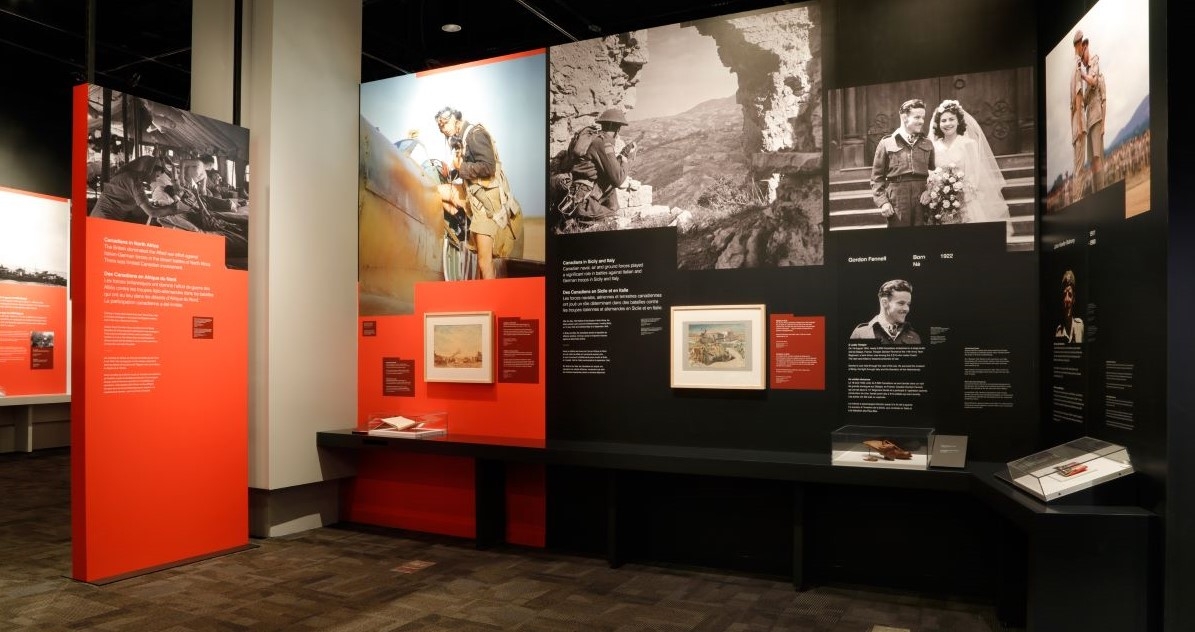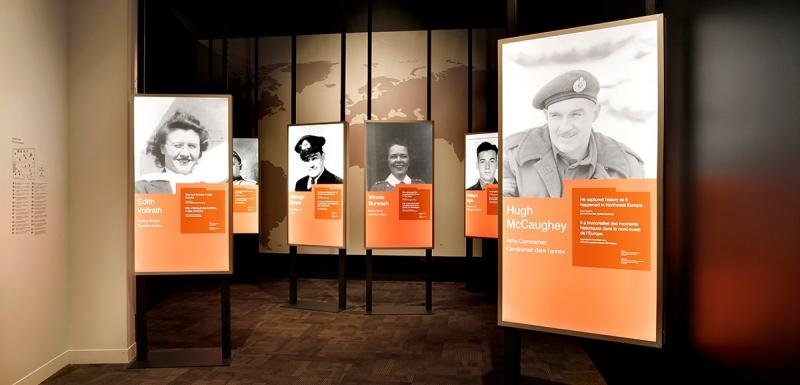
Canadian War Museum: Forever Changed, Stories From the Second World War
Forever Changed, the current temporary exhibit at the Canadian War Museum, explores Canada during the Second World War.
For those who are wondering why a museum that already covers Canadian military history is presenting a special exhibit on the Second World War, the exhibit focuses less on the technological aspect of the war and the battles that took place and more on the human costs and the effects of the war on Canadian society.
At the time conflict broke out, Canada was a nation of 11 million people. Forever Changed puts a human face to some of the almost 1.1 million Canadians who served in uniform and the over 3.1 million who contributed directly to the war effort — that is almost 4.2 million Canadians with first-hand involvement in the war.
Through personal stories the exhibit looks at Canadians on the home front and those who fought for abroad: against Nazi Germany in Europe, in North Africa, and against Imperial Japan in the Pacific theatre. By exploring the war experiences of several different Canadians, we see how the war shaped them and how it impacted their lives. The exhibit goes deeper by exploring individual personalities rather than simply stating their contribution to the war. Five of the most prominent people featured are; Edith Vollrath, a munitions worker from Ajax; Hugh McCaughey, a military cameraman who served in the European theatre and produced a highly awarded combat documentary series; Winnie Burwash, an army nurse who treated soldiers in England before being sent to mainland Europe; William Kyle, an RCAF pilot who fought in Burma; and Alex Campbell, an officer who fought in North Africa who, aside from being a strict officer, was a humorist and poet. Another interesting story is that of Minnie Eleanor Gray, a Black Canadian woman who served from 1945-1946 in the Netherlands. She describes it as the best years of her life despite the different outlook on race relations in Canada during the war years.

In addition to the personal stories visitors see how wartime production had an impact on modern day Canada. In order to produce the arms and other materials needed for the fight, hundreds of thousands of residents left their rural regions for factory jobs in urban centres. Most were laid off within months of the war ending but few moved back to their rural communities, thus contributing heavily to postwar urban expansion.
The exhibit highlights how Canadians partaking in the war effort wanted to be viewed as Canadians, not just as members of the commonwealth. Visitors can see mementos of this drive for national identity, such as a unique Canadian military battle flag designed at the beginning of the war to distinguish Canadians from the British. Other notable artifacts include posters for the CBC propaganda documentaries made during the war.
Further exploring the narrative of Canada coming into its own as a country as a result of the war, Forever Changed points out that England relied heavily on Canada after the fall of Dunkirk. In 1940, the British army was desperately short of men and material to defend the British Isles from German invasion. Canada sent pilots, soldiers and supplies to take up the slack. Canadians stationed in England are featured including exposes on Canadian pilots who fought in the Battle of Britain.
Canada's connection with the Netherlands has remained close ever since the end of the Second World War. It is personified through a pair of military boots a Canadian soldiers gave a Dutch teenager at the end of the war. The boy wore the shoes for many years before eventually emigrating to Canada, as did many other Dutch people. It's an interesting symbol and choice for a relationship defined by the war.
Perhaps the most moving part of the exhibit is the National Film Board documentary about six Canadian aviators whose supply flight disappeared in June of 1945 in Burma, present-day Myanmar. The wreckage of their plane was discovered in 1990 after 45 years of being listed as missing in action. The NFB film details the repatriation of the remains to a Commonwealth military grave. The flag, which covered the singular coffin containing all six men's remains, lies proudly near the end of the exhibit, along with relics from the crash site.
The exhibit is very compelling as it displays the personal side of a war that enveloped the globe for six bloody and ruthless years. It shows that Canadians have always had a strong sense of doing what's right, despite the personal sacrifices made.
When you go, make sure to fill out a card and hang it on the wall before you exit. The wall is filled with cards that further the story of how the war impacted the lives of everyday Canadians.
Forever Changed runs until September 4, 2021, admission is included with a general war museum admission.









